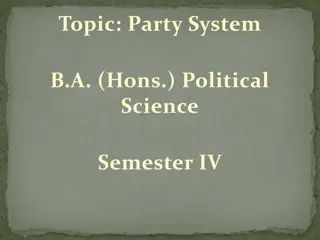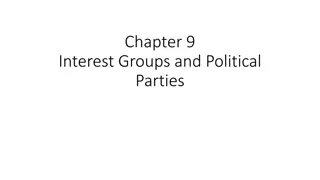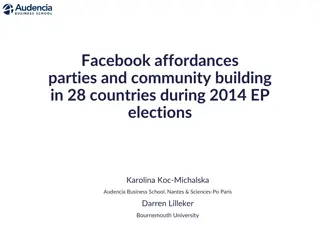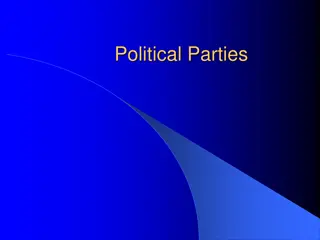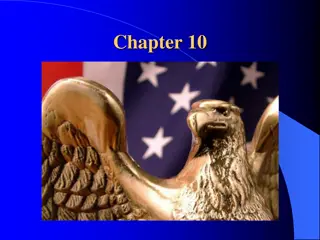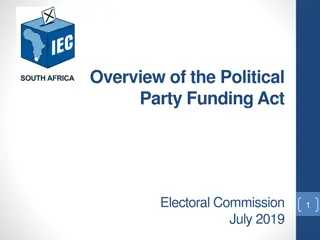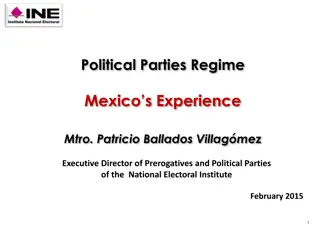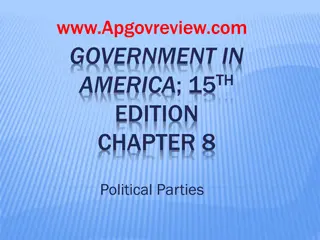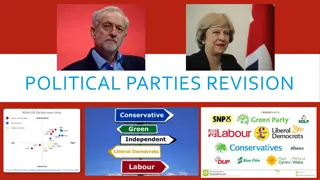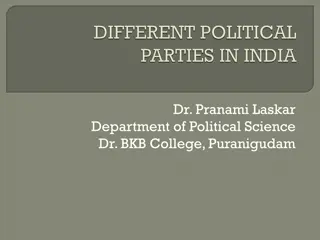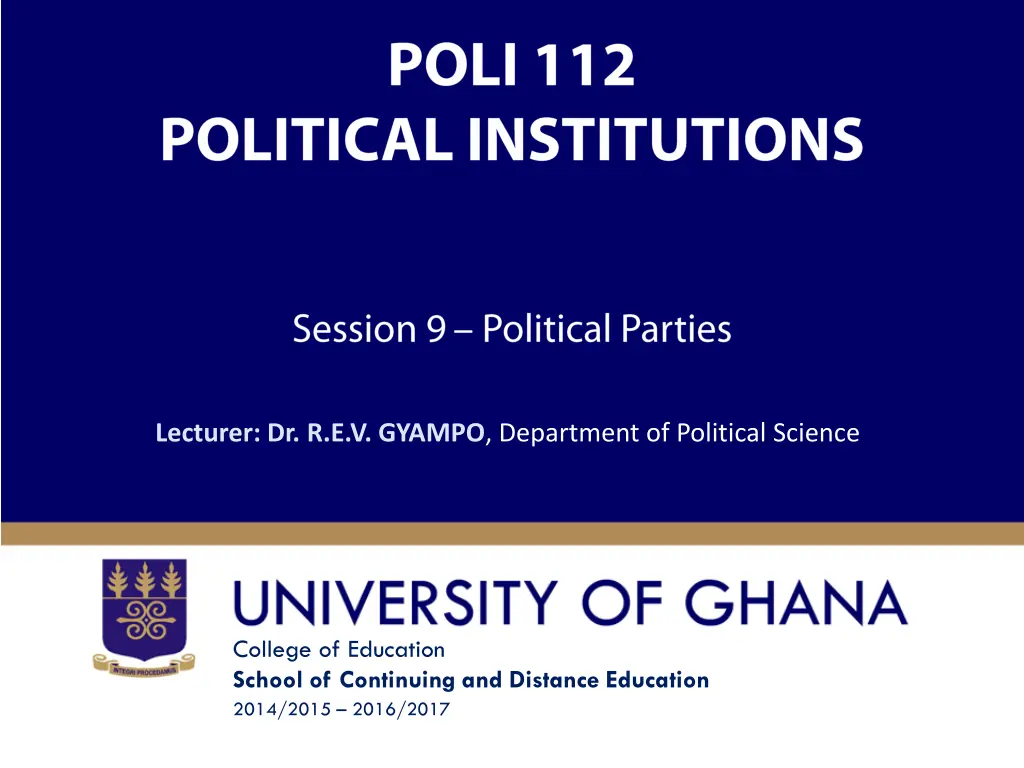
Understanding the Origin and Evolution of Political Parties
Explore the various theories of origin of political parties, including the Parliamentary Theory, Extra-Parliamentary Theory, and Modernization Theory. Learn how political parties are formed, their roles, and the difference between political parties and pressure groups.
Download Presentation

Please find below an Image/Link to download the presentation.
The content on the website is provided AS IS for your information and personal use only. It may not be sold, licensed, or shared on other websites without obtaining consent from the author. If you encounter any issues during the download, it is possible that the publisher has removed the file from their server.
You are allowed to download the files provided on this website for personal or commercial use, subject to the condition that they are used lawfully. All files are the property of their respective owners.
The content on the website is provided AS IS for your information and personal use only. It may not be sold, licensed, or shared on other websites without obtaining consent from the author.
E N D
Presentation Transcript
Lecturer: Dr. R.E.V. GYAMPO, Department of Political Science College of Education School of Continuing and Distance Education 2014/2015 2016/2017
Political Parties Defined A Political Party is an association of people who share more or less similar views on the major political and socio-economic problems facing their country and they combine to capture political power in order to apply those views. The difference between a political party and a pressure group is that whiles the former seeks to capture political power and govern, the latter may merely seek to influence governmental policies to favor the interest of its members Slide 2 Dr. R.E.V. GYAMPO, Dept of Political Science, UG
It is for example practiced in Britain while the Theories of Origin of Political Parties The Parliamentary Theory This theory states that the creation of Parliament preceded the birth of Political Parties. Parliaments were bodies which checked the government of monarchs. With time Parliament became divided along the lines of people who shared certain common political opinions sometimes based on differences in doctrine. A similar ideological division in the broader society led to the formation of electoral committees to ensure that each committee helped the election of its political persuasions to Parliament. The establishment of permanent connection between each Parliamentary groups and its electoral committees then resulted in the birth of Political Parties Slide 3 Dr. R.E.V. GYAMPO Dept of Political Science, UG .
Theories of Origin of Political Parties (Cont) Extra-Parliamentary Theory In some cases the genesis of political parties could be attributed to associations or organizations outside Parliament some of which initially had no political objectives. Among such organizations are philosophical clubs, Churches, trade unions etc. As they conducted their philosophical or trade union activities, some of the activities naturally paved the way for the birth of political parties. The British Labour Party is an example of such parties Slide 4 Dr. R.E.V. GYAMPO Dept of Political Science, UG
Theories of Origin of Political Parties (Cont) Modernization Theory According to this theory, Political Parties are modern organizations the history of which dates back only about one and a half centuries. The Political Party requires modern facilities like newspapers, modern transport and communication equipment etc for their effective operation. Without such modern facilities, there can be no political parties. Hence political parties are the product of the modernization process Slide 5 Dr. R.E.V. GYAMPO Dept of Political Science, UG
Types of Party Systems The Single Party System This is the political system in which only one officially recognized party rules. The communist Party of China, Communist Party of Cuba, and the Ba ath Party of Iraq are examples. There are different types of single Party system. Some allow considerable pluralism of societies. Others are monolithic and establish a direct link between the Party, the Government and the rest of the society. Slide 6 Dr. R.E.V. GYAMPO Dept of Political Science, UG
Types of Party Systems (Cont) Two-Party System - This is one in which regardless of the number of political parties in existence, only two parties have the political strength to win an election and form a government. Generally in typical two party states like the UK and US, there are other minor parties. These parties do not necessarily operate to win elections. They seek to champion specific interests Slide 7 Dr. R.E.V. GYAMPO Dept of Political Science, UG
Types of Party Systems (Cont) Multi Party System This is a political system in which several political parties of more or less equal strength exist such that it is always difficult for only one party to win a clear majority and form a Government without help from other smaller parties Slide 8 Dr. R.E.V. GYAMPO Dept of Political Science, UG
Types of Parties Political Parties are distinguished between doctrinal and non- doctrinal lines. A Doctrinal Party is one whose appeal is strongly based on ideological or moral principles. Parties that are strongly capitalist or socialist are doctrinal Parties A Non-doctrinal Party is one whose principles is Parties whose appeals or organizing principles rests on shed interests. Political Parties can also be distinguished on the type of membership. A MassParty is one in which for financial and ideological reasons is opened to all the ordinary members of the society. Slide 9 Dr. R.E.V. GYAMPO Dept of Political Science, UG
Types of Parties (cont) An Elite Party is one whose membership is not open to every member of the society. Membership is based on the selection of the chosen few who have prestige, special skills or substantial wealth. Example is the communist party of China. Slide 10 Dr. R.E.V. GYAMPO Dept of Political Science, UG
Party Organization Political parties are organized into caucuses, branches, cells and in some cases, militia. The party caucus is a narrow circle of special people within the Party and its membership is restricted. Membership is gained through selection or co-potation. A branch of a party is the totality of members in a particular geographical area. Membership is opened to all party supporters in that area. The cell is the smallest unit of a party and membership is based on occupation, that is, people in the party who are in the same occupation. A militia is a kind of private army within a political party. Dr. R.E.V. GYAMPO Dept of Political Science, UG Slide 11
Functions of Political Parties Political Socialization and Education Interest Aggregation Interest Articulation Training for Future Leaders Making Governments more democratic and Accountable Slide 12 Dr. R.E.V. GYAMPO Dept of Political Science, UG
Challenges Confronting Parties Lack of structures Lack of internal democracy Lack of autonomy Lack of Funding Corruption Creating instability Division in the state Brain wastage Offer distractive criticisms Slide 13 Dr. R.E.V. GYAMPO Dept of Political Science, UG
Logos/Symbols of some Political Parties in Ghana Slide 14 Dr. R.E.V. GYAMPO Dept of Political Science, UG
Reading List Refer to Unit 4, pp. 87 to 94 of Poli 112 (Political Institutions) Modules Gyampo, R.E.V. The state of Political Institutions in Ghana, (Saarbrucken, Germany: Lambert Academic Publishing Inc. 2012) pp. 113-147 Slide 15 Dr. R.E.V. GYAMPO Dept of Political Science, UG
Concluding Remark Brace yourself for Lecture 10 THANK YOU Slide 16 Dr. R.E.V. GYAMPO Dept of Political Science, UG


